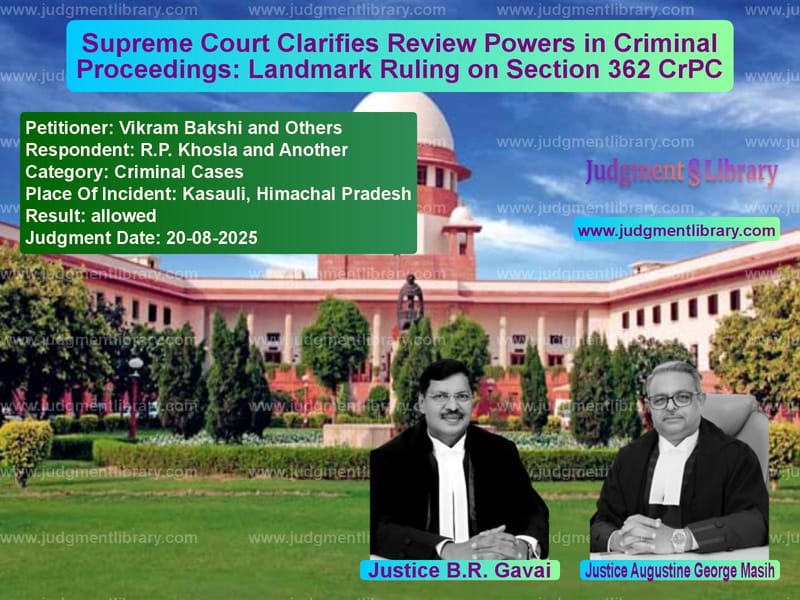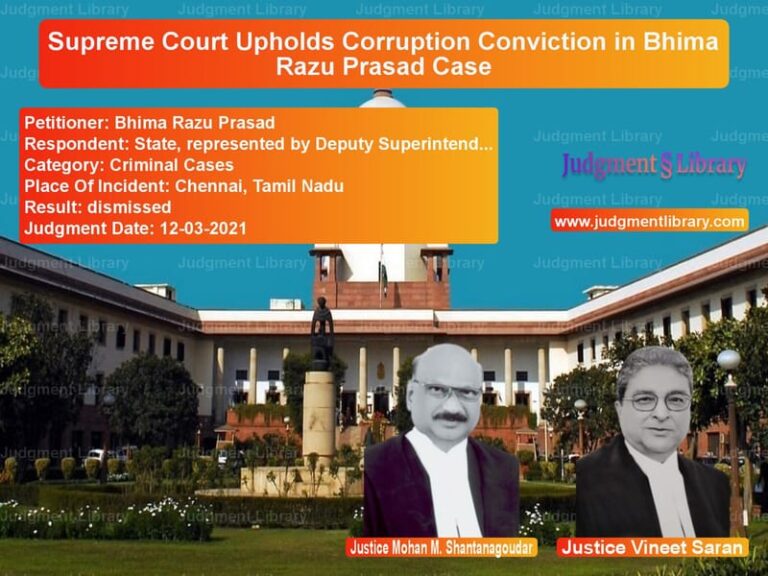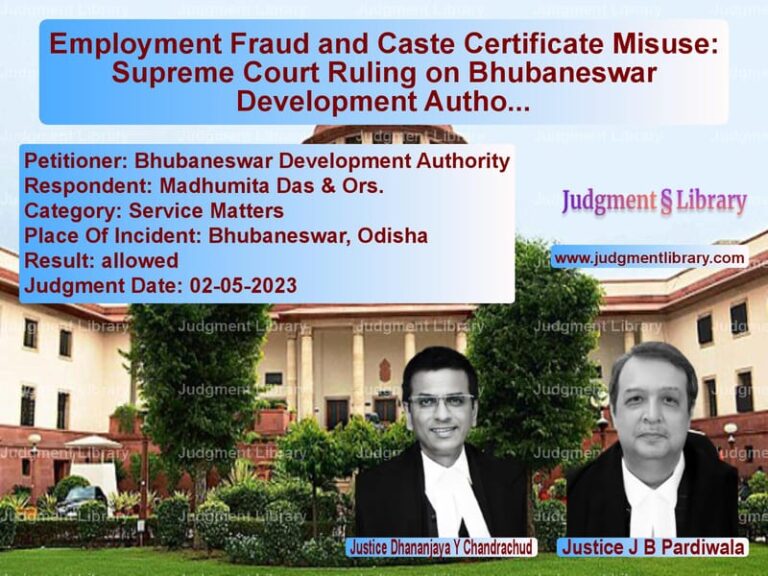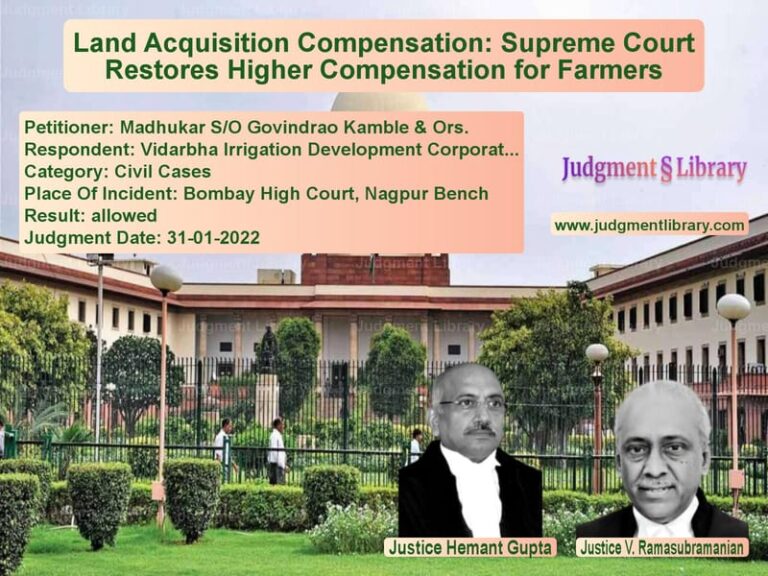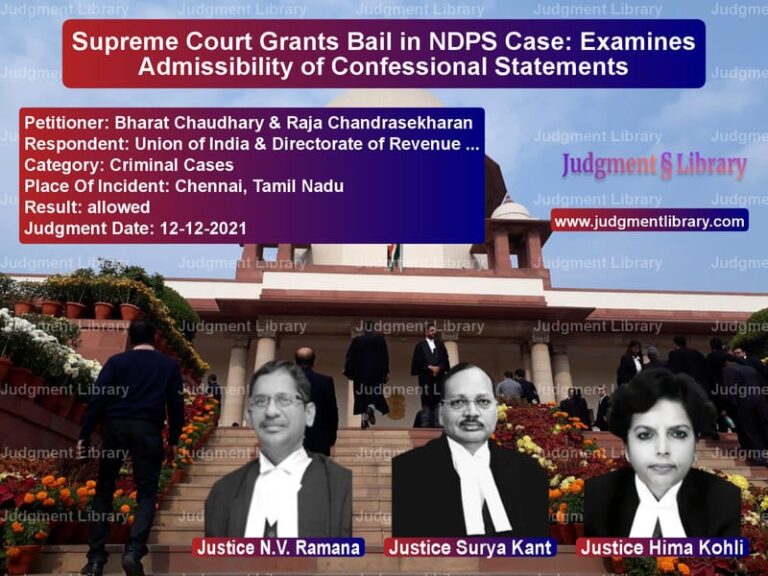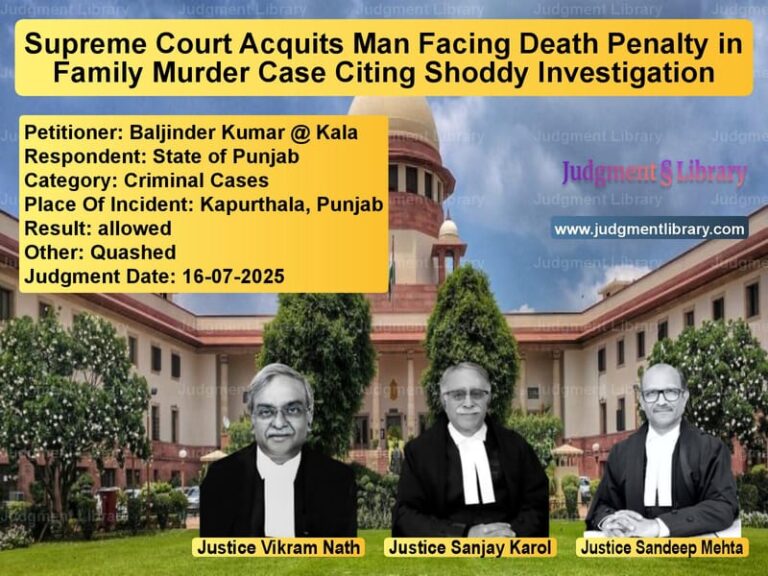Supreme Court Clarifies Review Powers in Criminal Proceedings: Landmark Ruling on Section 362 CrPC
In a significant judgment that clarifies the boundaries of judicial review in criminal matters, the Supreme Court of India has delivered a landmark ruling that reinforces the finality of criminal proceedings and limits the circumstances under which courts can revisit their decisions. The case involved a complex legal battle between two business groups that stretched over nearly two decades, ultimately raising fundamental questions about the power of criminal courts to review their own judgments.
The dispute originated from a business collaboration between the Khosla Group and Bakshi Group for developing a resort in Kasauli, Himachal Pradesh. What began as a commercial partnership soon descended into protracted litigation, with both groups accusing each other of various wrongdoings. The core of the controversy centered around allegations of forged documents and false affidavits filed in court proceedings.
At the heart of the Supreme Court appeal was the question of whether the Delhi High Court had the authority to recall its own judgment in a criminal matter. The High Court had initially dismissed an application filed by the Khosla Group under Section 340 of the Criminal Procedure Code (CrPC), which deals with prosecution for perjury and fabrication of evidence. However, later, the High Court recalled this dismissal order, leading to the appeal before the Supreme Court.
The appellants, Vikram Bakshi and others from the Bakshi Group, represented by their senior counsel, made compelling arguments challenging the High Court’s authority to review its own decision. “The learned Senior Counsel for the Appellants contends that there is no power of review under Criminal Procedure Code of 1973. The only power available under Section 362 of CrPC is to correct a clerical or arithmetical error.” This argument struck at the very foundation of the case, questioning whether criminal courts have the same review powers as their civil counterparts.
The appellants’ counsel relied heavily on established legal precedent, particularly “Sanjeev Kapoor vs. Chandana Kapoor and Others which held that that there are only two relaxations given from the rigour of Section 362 of CrPC where such power to alter or review is provided either (i) by the CrPC itself or (ii) by any other law for time being in force and no such relaxations are met out in the Impugned Order.” This highlighted the strict limitations placed on criminal courts regarding reviewing their decisions.
Perhaps the most significant argument advanced by the appellants was that “the High Court acted in violation of this Court’s above judgment while passing the Impugned Order.” This referred to the Supreme Court’s earlier judgment dated May 8, 2014, which had specifically directed that the matter should be decided by the Company Law Board (now NCLT) and that the High Court should not proceed with applications under Section 340 CrPC.
On the other side, the respondents, R.P. Khosla and others from the Khosla Group, presented counter-arguments defending the High Court’s decision to recall its order. Their counsel contended that “the Impugned Order dated 05.05.2021 is a classic manifestation of the court undoing its own wrong.” This argument suggested that courts have inherent powers to correct their own errors, even in criminal matters.
The respondents’ counsel made a crucial distinction between different types of review, arguing that “the Order was not passed under any statutory provision but by the court acting ex debito justitiae in order to undo the injurious effect flowing from its factually erroneous observation.” This Latin term refers to a court’s inherent power to do justice, suggesting that technical procedural limitations should not prevent courts from correcting substantive errors.
A key aspect of the respondents’ argument was the distinction between procedural and substantive review. They relied on “Ganesh Patel vs. Umakant Rajoria which relying on Grindlays Bank Ltd. vs. Central Government Industrial Tribunal and Others has carved out a distinction between ‘procedural review’ and ‘substantive review’ and has clarified that when it comes to procedural review, the rigour of Section 362 of CrPC will not be attracted.” This argument attempted to create an exception to the general prohibition against review in criminal matters.
The respondents also challenged the characterization of the proceedings as purely criminal, arguing that “while passing its Judgment dated 13.08.2020, the High Court was not dealing with a criminal proceeding per se, as the outcome of application filed under Section 340 of CrPC does not directly result into any sentence or fine or any other implication which is a necessary outcome for a proceeding to be of criminal in nature.” This sought to remove the case from the strict limitations of Section 362 CrPC.
The Supreme Court, in its judgment delivered by Justice Augustine George Masih with Chief Justice B.R. Gavai concurring, provided a comprehensive analysis of the legal principles governing review powers in criminal proceedings. The court began by examining the statutory framework, noting that “The law relating to power of a criminal court to review or alter its own judgment or order is governed by the provisions of Section 362 of CrPC.” The court reproduced the exact language of the provision: “362. Court not to alter judgment.— Save as otherwise provided by this Code or by any other law for the time being in force, no Court, when it has signed its judgment or final order disposing of a case, shall alter or review the same except to correct a clerical or arithmetical error.”
The court extensively reviewed its previous decisions on the subject, noting that “The scope of Section 362 of CrPC has been discussed and elaborated by a three-judge bench decision of this Court in State of Kerala vs. M.M. Manikantan Nair, wherein it held that CrPC does not authorize High Court to review its judgment or order passed either in exercise of its appellate, revisional or original jurisdiction.” This established the general prohibition against review in criminal matters.
The court acknowledged that there are limited exceptions to this general rule, observing that “This Court, however, in exceptional cases, has carved out limited scope for exercise of review power by criminal courts.” The judgment carefully distinguished between different types of review, noting that “In Grindlays Bank Ltd. (supra), it was observed that review can be distinguished between ‘procedural review’ and ‘substantive review’. A ‘procedural review’ is inherent or implied in a court to set aside a palpably erroneous order passed under misapprehension by it, however, a ‘substantive review’ is when error sought to be corrected is one of law and is apparent on the face of the record.”
The court provided a comprehensive summary of the circumstances under which criminal courts can review their decisions: “a. Such power is expressly conferred upon court by CrPC or any other law for the time being in force or; b. The court passing such a judgement or order lacked inherent jurisdiction to do so or; c. A fraud or collusion is being played on court to obtain such judgment or order or; d. A mistake on the part of court caused prejudice to a party or; e. Fact relating to non-serving of necessary party or death leading to estate being non-represented, not brought to notice of court while passing such judgment or order.”
The court made an important clarification about these exceptions, stating that “all these exceptions are only exercisable for seeking a recall or review of an order or judgment, if a ground that is raised was not available or existent at the time of original proceedings before the Court. Mere fact that the said ground, although available, was not raised or pressed during the concerned proceedings, does not provide for an exemption to the parties to assert it as a ground.”
In applying these principles to the case at hand, the court found that the High Court’s recall order was not justified. The court noted that “neither the Impugned Order falls within the ambit of ‘procedural review’ to not attract the bar of Section 362 CrPC, nor is it the case of the Khosla Group that they were either denied a hearing before the High Court or were not given an opportunity to inform the court of the said development.”
The court was particularly critical of the Khosla Group’s conduct, observing that “It rather appears as an intentional attempt to mislead the court.” The judgment pointed out that “Ms. Sonia Khosla of the Khosla Group had herself withdrawn the CP 114 of 2007 on 07.02.2020 that too, more than six months before the passing/pronouncement of the Judgment dated 13.08.2020.” This timing was crucial because it showed that the information about the withdrawal was available during the original proceedings but was not brought to the court’s attention.
The court concluded with a strong statement about the importance of finality in judicial proceedings: “Such an act to undermine the finality of the judicial proceedings cannot be permitted especially in such situations of deliberate omissions or misrepresentation on the part of the parties before the court and thereafter attempting to defend themselves and obtaining the verboten order dated 05.05.2021, substantially reviewing and recalling the Judgment dated 13.08.2020, under the garb of ‘procedural review’ which is impermissible.”
This judgment serves as an important reminder of the strict limitations on review powers in criminal proceedings and reinforces the principle of finality in judicial decisions. It provides clear guidance to courts across the country about when they can and cannot revisit their decisions in criminal matters, while also sending a strong message against attempts to misuse legal processes through deliberate omissions or misrepresentations.
Petitioner Name: Vikram Bakshi and Others.Respondent Name: R.P. Khosla and Another.Judgment By: Justice B.R. Gavai, Justice Augustine George Masih.Place Of Incident: Kasauli, Himachal Pradesh.Judgment Date: 20-08-2025.Result: allowed.
Don’t miss out on the full details! Download the complete judgment in PDF format below and gain valuable insights instantly!
Download Judgment: vikram-bakshi-and-ot-vs-r.p.-khosla-and-anot-supreme-court-of-india-judgment-dated-20-08-2025.pdf
Directly Download Judgment: Directly download this Judgment
See all petitions in Fraud and Forgery
See all petitions in Legal Malpractice
See all petitions in Contempt Of Court cases
See all petitions in Judgment by B R Gavai
See all petitions in Judgment by Augustine George Masih
See all petitions in allowed
See all petitions in supreme court of India judgments August 2025
See all petitions in 2025 judgments
See all posts in Criminal Cases Category
See all allowed petitions in Criminal Cases Category
See all Dismissed petitions in Criminal Cases Category
See all partially allowed petitions in Criminal Cases Category

